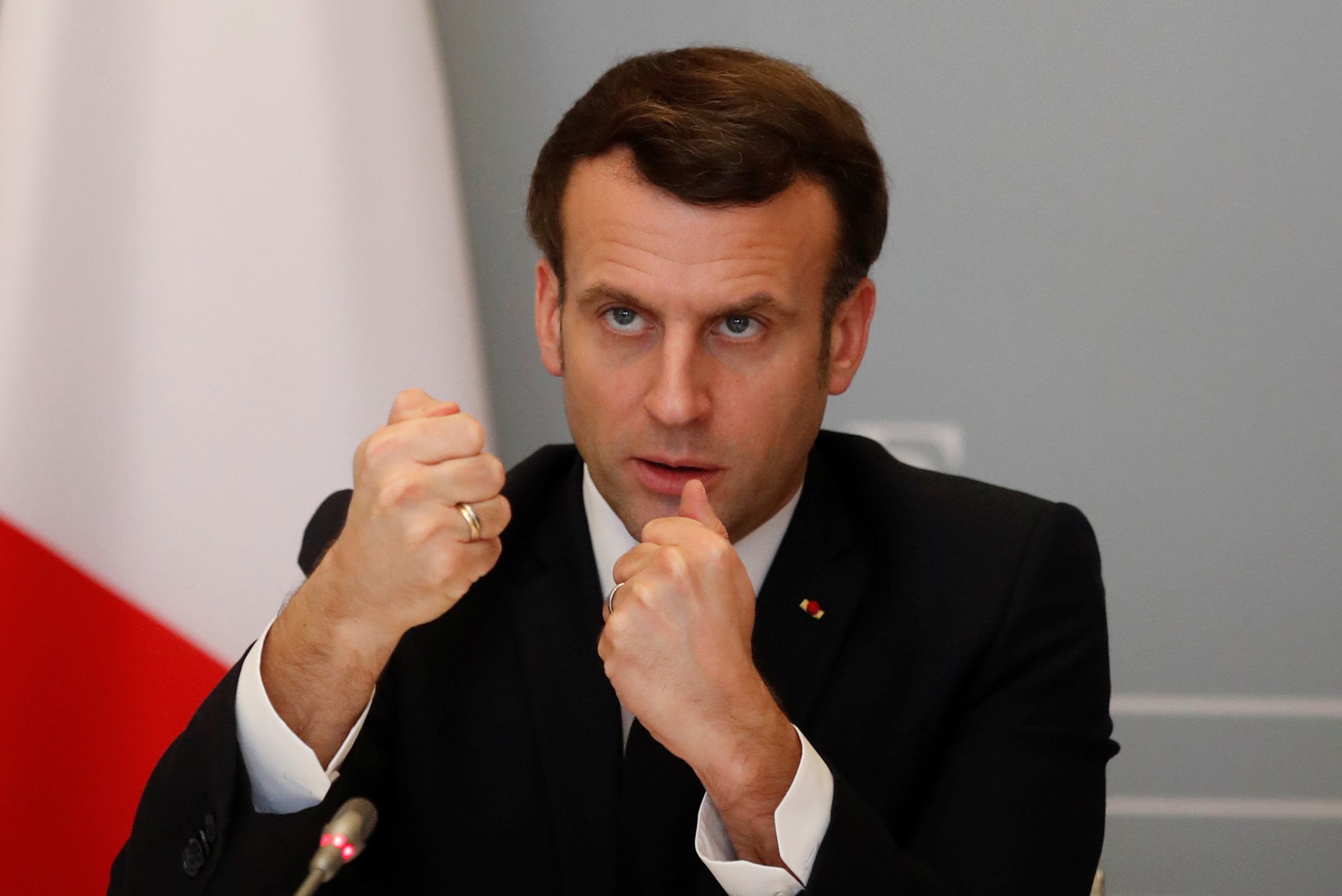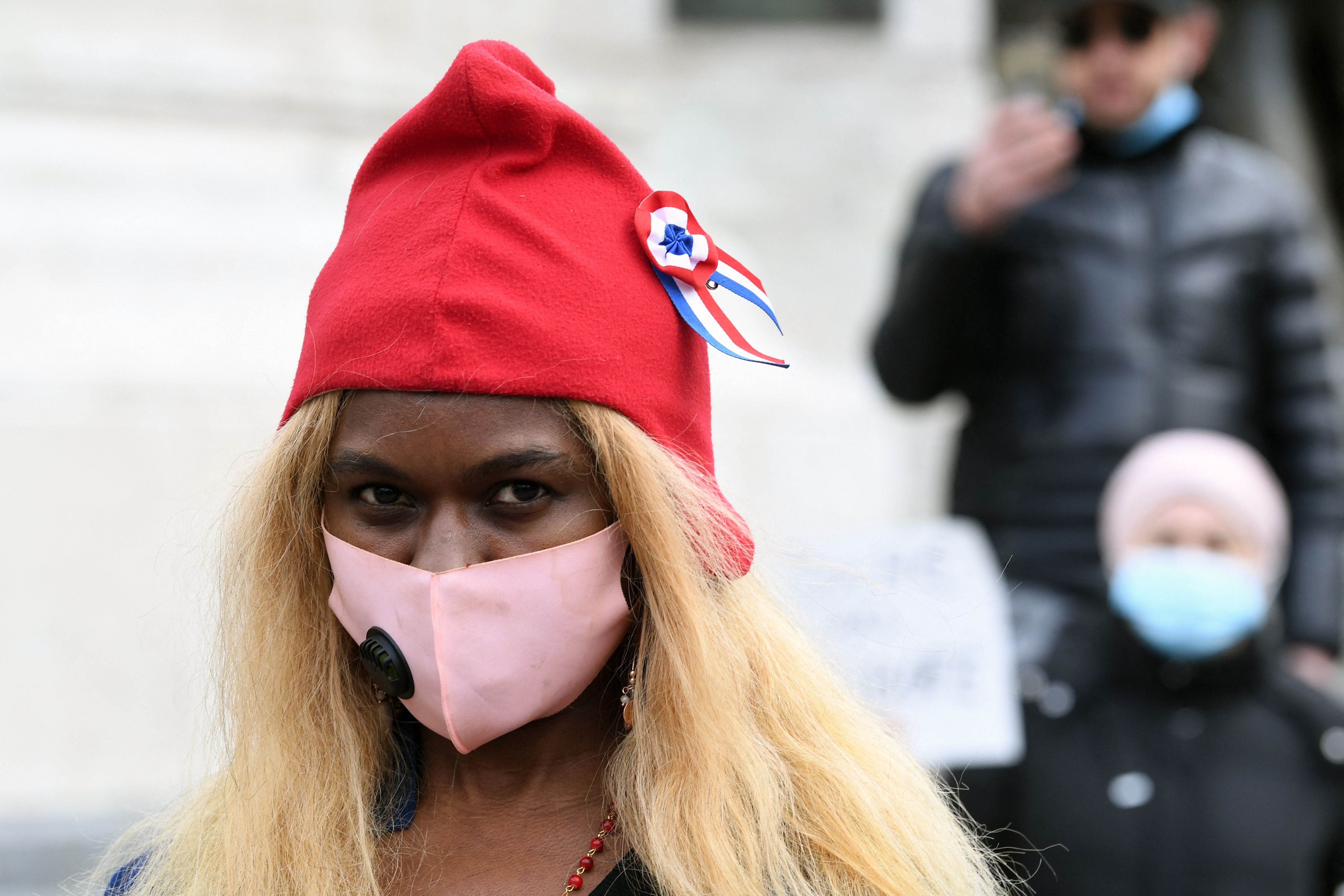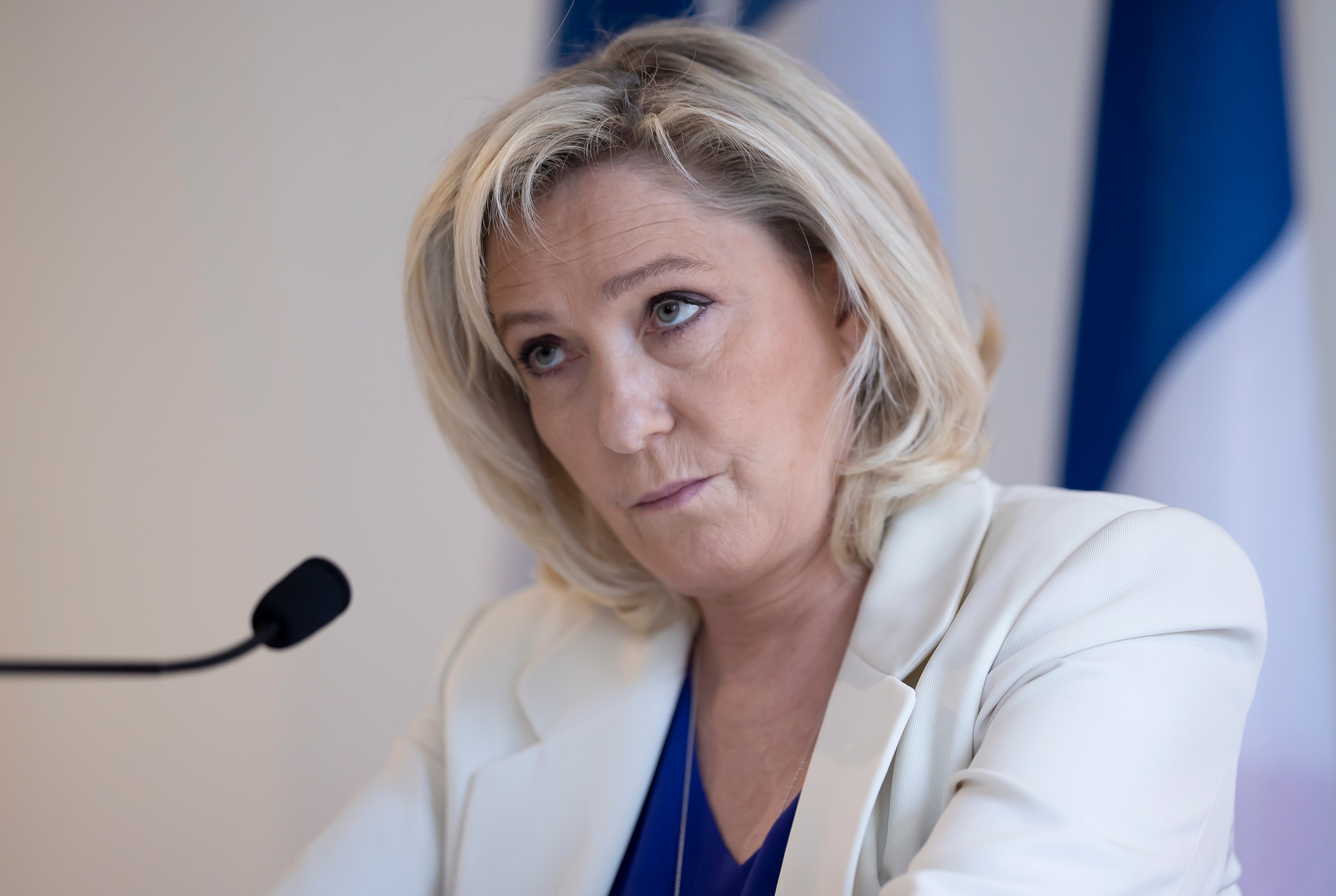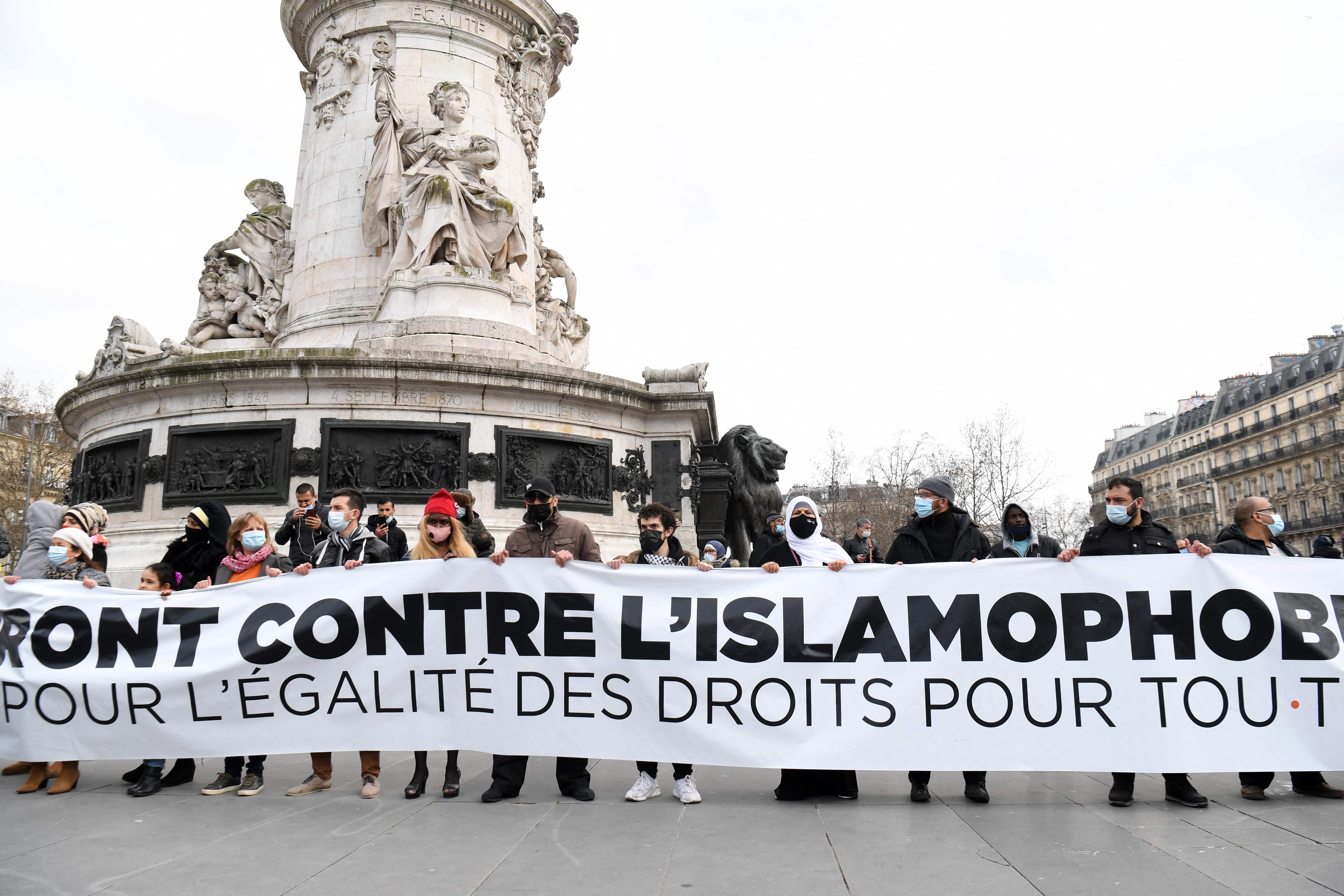Moderate no more: Macron courts far-right as France turns attention to next year’s presidential election
As jostling begins for the 2022 election, President Emmanuel Macron’s centrist party has begun using the language of the right, reports Borzou Daragahi


Marine Le Pen is often seen as the premier anti-Muslim politician and anti-immigrant bigot of France, and even Europe.
But in a televised debate last month with French interior minister Gerald Darmanin, of president Emmanuel Macron’s centrist Forward party, she suddenly found herself the defender of Muslim rights while her opponent accused her of having “gone a bit soft” on the nation’s largest religious minority. “You need to take some vitamins,” he said. “You’re not tough enough here.”
Le Pen was dumbfounded. “I can confirm that I don’t intend to attack Islam, which is a religion like any other,” she said. “And, because I am strongly attached to our French values, I want to conserve total freedom of religion.”
It was among the most jaw-dropping moments of recent French political life, and showed just how deeply ideas that were once the property of the far-right have spread into mainstream discourse.
“I voted for Macron, and am 99 per cent sure I would vote for him again,” says Gerard Araud, a former French diplomat and New York-based commentator on politics in his own country and the US. “But when I heard this, I had my doubts about my own vote.”
Read more:
The episode is part of a political dynamic in which French centrists co-opt the positions far right on Islam in what is seen as an attempt to keep surging extremists out of office.
According to Macron and his allies, the great threat on the streets comes not from the mostly right-wing “Yellow Vests” who disrupted traffic and roughed up police for months, but from Black, poor and often Muslim youth in suburban apartment towers who try to film the police brutalising them.
And the new menace to French values and its way of life are not corporations paying meagre taxes while doling stagnant wages and destroying rural communities with gigantic “hyper-markets”, but “Islamo-gauchisme,” or Islamic leftism, a murky synthesis of pro-Muslim apologism and campus leftism that is supposedly silencing criticism of creeping Islamism.
In parliament, a controversial wide-ranging law bill that will likely be made law soon would give the government more official control over mosques, schools, sports clubs and medical practices in an attempt to ferret out perceived Muslim “separatism” under the guise of “respect for the principles of the republic”.
The Macron government is steadfastly opposing a plan to use government funds to help build a mosque for Muslims in the city of Strasbourg, arguing that the Islamic organisation backing the project has refused to sign onto a statement denouncing political Islam.
“This is definitely related to their obsession with the possible rise of the far right,” said Ziad Majed, a professor of political science at the American University of Paris. “They’re trying to compete with the far right on the ground of the far right.”
The backdrop to the focus on Muslims and Islam in the political debate ahead of the April 2022 vote is the horrific murder last October of schoolteacher Samuel Paty, who was beheaded by a Muslim immigrant for teaching students about the controversy surrounding the caricatures of the Prophet Muhammad published in the magazine Charlie Hebdo.

But the debate about Muslims in France has been festering for years. It often employs terminology, cliches and tropes that would cause those in the US or even the less woke UK to cringe.
On radio programmes and television talk shows, self-appointed experts with little connection to France’s complex tapestry of Muslim communities call out what they describe as social deviancy and dysfunction using vague examples rooted in poorly informed stereotypes.
“Every time we have a terrorist attack we switch the conversation to the place of Islam in France,” says Rim Sarah Alouane, a Toulouse-based legal scholar. “The theme is that Islam is a religion that needs to be tamed, controlled, that it is foreign to the country.”
The focus in recent weeks on Islamo-gauchisme, a term originally coined to denigrate academic critics of Israel among the French left, has caught particular fire, spurring debates on talk shows, radio programmes and virtual classrooms as well as opinion pieces in journals of the left and right.
Higher education minister Frederique Vidal called for an investigation into whether Islamo-gauchisme had infiltrated social sciences and humanities in the form of imported “Anglo-Saxon” discourses on race and cultural identity.

The debate is rooted in French exceptionalism that denies the existence of racism because the French claim they see no race – only French culture. The type of freewheeling live-and-let-live multiculturalism espoused in other western countries is considered toxic, leading to the type of divisiveness that puts personal gender, sexuality, religious or cultural identity, or ethnic status on par or even ahead of Frenchness.
“You have a French problem with religion, any religion which is quite different from Americans and others,” said Araud. “Then you see suddenly Islam coming and saying, ‘We want to exist and be in the public sphere’,”
Ironically, the intellectual pillars of the academic and political initiatives associated with movements for LGBT+, minority and women’s rights and other forms of identity politics and representation in North America were imported from France via the applications of theories of power and society developed by French intellectuals such as Jacques Derrida and Michel Foucault. But French policymakers and a broad swathe of the elite regard such thinking as unwelcome imports from American campuses.
Unlike other esoteric debates that occasionally rage within the French intellectual world, the focus on Muslims and their alleged defenders is one with potential real-world consequences. It targets the country’s beleaguered Muslim minority, which make up 5 per cent of the French population but an outsized proportion of the public discourse and obsession.
Several scholars noted that the focus on Islam and leftist-tinged identity politics as the great culprits of broad French malaise harkens back to the antisemitically-tinged “Judeo-Bolshevism” that French traditionalists complained was wreaking havoc on France in the 1920s and 1930s, just before the country submitted to Nazi rule.
Though Macron and his closest advisers have refrained from raising the threat of Islamo-guachisme, the debate continues.
They’re trying to compete with the far right on the ground of the far right
“The identitarian, differentialist or racialist approach of society must not erase its analysis in terms of class struggle, the critical and emancipatory significance of which is universal,” the intellectual Yvon Quiniou wrote in the journal Marianne earlier this month.
Others worry that the disparagement of scholarly work could silence or hamper serious efforts to understand radicalisation within the Muslim community. “What they mean by Islamo-gauchiste are those academics who try to explain this identity crisis that some immigrants have by discussing their social and economic exclusion,” says Majed.
Worries about a confluence of Islamists and leftists resonate among some voters. A poll conducted by the European Council of Foreign Relations found that seven out of 10 voters thought Islamo-gauchiste thinking was a problem.
During a recent lunchtime chat, several educated upper middle-class French professionals echoed concerns about what they described as rampant identity politics infecting campuses, though they were hard-pressed to identify any particular advocates of Islamo-gauchisme.
“No one would admit that they are an Islamo-gauchiste,” said one.
But it also remains unclear whether the summoning the Islamo-gauchiste spectre and targeting the supposed Muslim refusal to integrate will be enough to give Macron the win next year.

He is currently polling behind Le Pen for the first round of 2022 presidential elections and only with a slight lead in a head-to-head match-up. The first-round presidential field is crowded, and many political analysts worry that the scheme could backfire by bolstering the arguments of the far-right. If Islam is a problem and France needs to take a tough approach, why go for the milquetoast Macron rather than Le Pen?
Scholars and political analysts argue that a more enlightened approach would focus on highlighting the many Muslims who have managed to integrate and succeed on their own terms in French society and recruiting Muslim community leaders in a shared goal of fighting Islamic radicalism. Alouane noted that it was Muslims who had first warned law enforcement about the erratic behaviour of the Chechen immigrant who murdered Samuel Paty, to no avail.
“There’s a strong secular tradition in the country both from the left and right, and there’s a concern about these issues including among Muslim leaders as well,” says Benjamin Haddad, head of the Europe programme at the Atlantic Council, a Washington think tank. “What’s key here is to find liberal democratic responses rather than let the far-right shape a nationalistic, populist response.”
Join our commenting forum
Join thought-provoking conversations, follow other Independent readers and see their replies
Comments
Bookmark popover
Removed from bookmarks